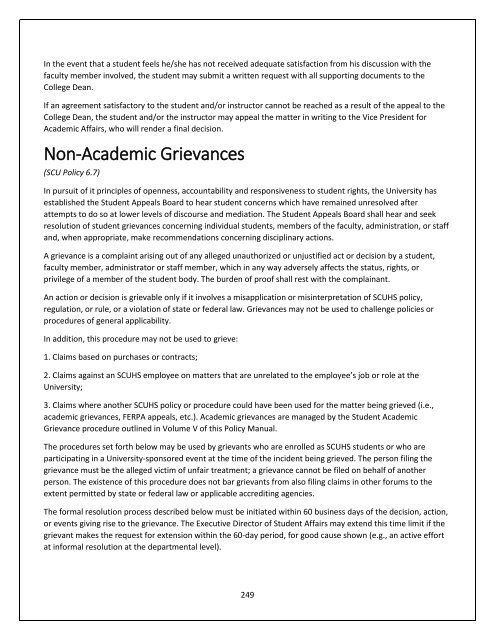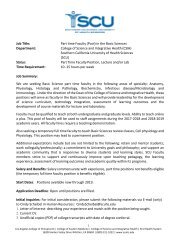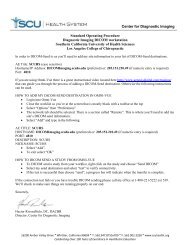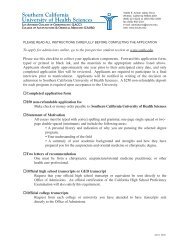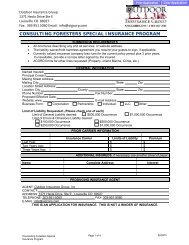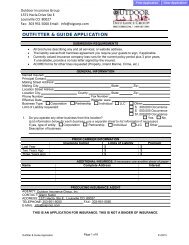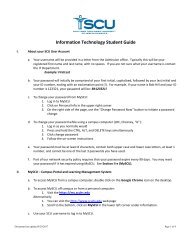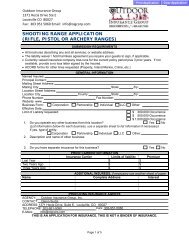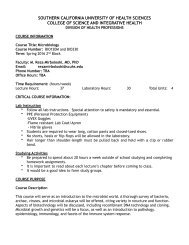Vision, Mission, and Guiding Principles for SCUHS
Southern California University of Health Sciences will be recognized as the premier evidence-based integrative healthcare university. in this PDF we are discussing about our Vision, Mission, and Guiding Principles. Please have a look. you can also go with this link: https://bit.ly/2JuIItL
Southern California University of Health Sciences will be recognized as the premier evidence-based integrative healthcare university. in this PDF we are discussing about our Vision, Mission, and Guiding Principles. Please have a look. you can also go with this link: https://bit.ly/2JuIItL
Create successful ePaper yourself
Turn your PDF publications into a flip-book with our unique Google optimized e-Paper software.
In the event that a student feels he/she has not received adequate satisfaction from his discussion with the<br />
faculty member involved, the student may submit a written request with all supporting documents to the<br />
College Dean.<br />
If an agreement satisfactory to the student <strong>and</strong>/or instructor cannot be reached as a result of the appeal to the<br />
College Dean, the student <strong>and</strong>/or the instructor may appeal the matter in writing to the Vice President <strong>for</strong><br />
Academic Affairs, who will render a final decision.<br />
Non-Academic Grievances<br />
(SCU Policy 6.7)<br />
In pursuit of it principles of openness, accountability <strong>and</strong> responsiveness to student rights, the University has<br />
established the Student Appeals Board to hear student concerns which have remained unresolved after<br />
attempts to do so at lower levels of discourse <strong>and</strong> mediation. The Student Appeals Board shall hear <strong>and</strong> seek<br />
resolution of student grievances concerning individual students, members of the faculty, administration, or staff<br />
<strong>and</strong>, when appropriate, make recommendations concerning disciplinary actions.<br />
A grievance is a complaint arising out of any alleged unauthorized or unjustified act or decision by a student,<br />
faculty member, administrator or staff member, which in any way adversely affects the status, rights, or<br />
privilege of a member of the student body. The burden of proof shall rest with the complainant.<br />
An action or decision is grievable only if it involves a misapplication or misinterpretation of <strong>SCUHS</strong> policy,<br />
regulation, or rule, or a violation of state or federal law. Grievances may not be used to challenge policies or<br />
procedures of general applicability.<br />
In addition, this procedure may not be used to grieve:<br />
1. Claims based on purchases or contracts;<br />
2. Claims against an <strong>SCUHS</strong> employee on matters that are unrelated to the employee’s job or role at the<br />
University;<br />
3. Claims where another <strong>SCUHS</strong> policy or procedure could have been used <strong>for</strong> the matter being grieved (i.e.,<br />
academic grievances, FERPA appeals, etc.). Academic grievances are managed by the Student Academic<br />
Grievance procedure outlined in Volume V of this Policy Manual.<br />
The procedures set <strong>for</strong>th below may be used by grievants who are enrolled as <strong>SCUHS</strong> students or who are<br />
participating in a University-sponsored event at the time of the incident being grieved. The person filing the<br />
grievance must be the alleged victim of unfair treatment; a grievance cannot be filed on behalf of another<br />
person. The existence of this procedure does not bar grievants from also filing claims in other <strong>for</strong>ums to the<br />
extent permitted by state or federal law or applicable accrediting agencies.<br />
The <strong>for</strong>mal resolution process described below must be initiated within 60 business days of the decision, action,<br />
or events giving rise to the grievance. The Executive Director of Student Affairs may extend this time limit if the<br />
grievant makes the request <strong>for</strong> extension within the 60-day period, <strong>for</strong> good cause shown (e.g., an active ef<strong>for</strong>t<br />
at in<strong>for</strong>mal resolution at the departmental level).<br />
249


